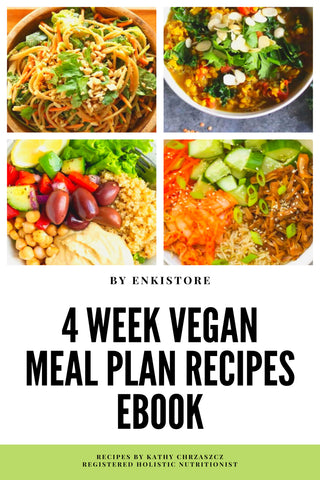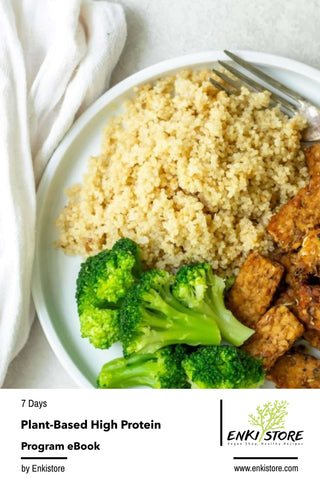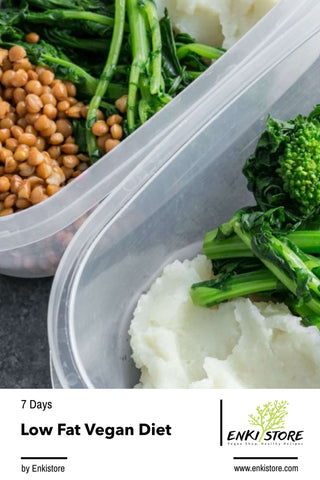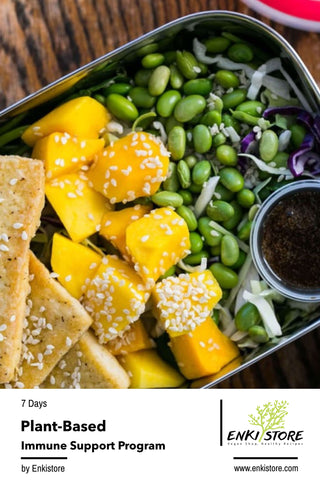Nourishing Vegan Meal Plan: Comprehensive Health Benefits
May 03, 2023
Enki Store
Discover the Comprehensive Health Benefits of a Vegan
Introduction
The Rise of Veganism
Have you noticed the growing popularity of veganism? From celebrity endorsements to plant-based food options popping up in grocery stores and restaurants, it’s clear that veganism is more than just a trend. But what exactly is veganism?
At its core, veganism is a lifestyle that seeks to avoid the use and consumption of animal products, including meat, dairy, eggs, honey, and even certain types of clothing and cosmetics. Veganism has gained momentum as people become increasingly aware of the negative impact that animal agriculture has on our health and the environment.
According to research by The Good Food Institute, sales of plant-based foods have increased by 29% over the last two years alone. It’s no wonder more people are giving veganism a try!
However, it's essential to keep in mind that simply cutting out animal products from your diet does not guarantee good health. A balanced vegan meal plan is crucial for providing your body with all the nutrients it needs.
The Importance of a Balanced Diet
Whether you're following a vegan diet or not, maintaining a balanced diet is vital for good health. Consuming an array of fruits, vegetables, whole grains, legumes (beans), nuts and seeds helps ensure you get all the essential vitamins and minerals necessary for optimal health. A balanced diet also helps reduce your risk for chronic diseases such as heart disease or type 2 diabetes.
When transitioning to a vegan meal plan or making any other significant dietary change; it's important to focus on variety rather than restriction. You want to make sure you're getting plenty of protein-rich plant foods like legumes (beans), lentils or chickpeas while still incorporating carbohydrates like quinoa or brown rice into your meals.
And don't forget about healthy fats such as avocado or nuts! Strive for balance, and you'll be well on your way to reaping the benefits of a vegan meal plan.
Health Benefits
Reduced risk of chronic diseases such as heart disease, diabetes, and cancer
Switching to a vegan meal plan has numerous health benefits, including a lowered risk of chronic diseases. Heart disease is the leading cause of death worldwide, and studies have shown that a vegan diet can significantly reduce the risk of heart disease.
Plant-based diets are naturally low in saturated fat and cholesterol, which are key contributors to heart disease. Additionally, the high fiber content in plant-based foods helps to reduce blood pressure and improve overall cardiovascular health.
Diabetes is another chronic disease that can be prevented or managed with a vegan diet. Plant-based foods are rich in complex carbohydrates and fiber which regulate blood sugar levels, thereby decreasing the risk of developing type 2 diabetes.
Vegan diets also help with weight management which is another key factor in preventing diabetes. Cancer is also linked to dietary habits.
A vegan diet is rich in antioxidants which help prevent cell damage that can lead to cancerous growths. Moreover, plant-based foods contain phytochemicals which have been shown to fight cancer cells directly while also strengthening the immune system.
Improved digestion and gut health
A vegan meal plan has many benefits for your digestive system as well. Animal products such as dairy can be difficult for some people to digest due to lactose intolerance or other factors related to gut microbiome diversity. On the other hand, plant-based sources of protein like legumes are easier for our bodies to break down.
Moreover, a vegan diet contains high amounts of fiber which promotes healthy digestion by aiding bowel movements and maintaining regularity. Fiber also stimulates the growth of healthy bacteria in your gut microbiome which plays an important role in overall health by improving nutrient absorption and reducing inflammation.
Plant-based diets contain prebiotics – foods that nourish beneficial bacteria – such as garlic, onion, bananas and asparagus. Prebiotics enhance the health of our gut microbiome which in turn supports our immune system.
Environmental Benefits
Lower Carbon Footprint Compared to Meat-Based Diets
One of the most significant benefits of adopting a vegan meal plan is its lower carbon footprint compared to meat-based diets. Animal agriculture is responsible for a substantial amount of greenhouse gas emissions, with cows alone producing over 150 billion gallons of methane per day.
Methane is known to be one of the most potent greenhouse gases, contributing significantly to climate change. By reducing or eliminating animal products from our diet, we can significantly reduce our carbon footprint and combat climate change.
Reduced Water Usage and Land Degradation
Another environmental benefit of veganism is the reduced water usage and land degradation associated with plant-based diets. Animal agriculture requires large amounts of water for watering crops, providing drinking water for animals, and cleaning facilities. In contrast, a plant-based diet requires significantly less water since plants need less water than animals do.
Additionally, animal agriculture often leads to soil erosion and deforestation as farmers clear land to raise more animals or grow crops to feed them. By choosing a vegan meal plan, we reduce our impact on natural resources and help protect our planet.
Decreased Greenhouse Gas Emissions
Adopting a vegan meal plan can significantly decrease greenhouse gas emissions associated with food production. Livestock farming requires significant amounts of energy for transportation, processing, refrigeration, packaging, and distribution.
All these steps require the burning of fossil fuels such as coal or oil that release greenhouse gases into the atmosphere. In contrast, plant-based foods use fewer resources throughout their life cycle than meat-based alternatives since they require less processing and transport due to shorter supply chains.
Adopting a vegan meal plan has numerous environmental benefits such as reducing carbon footprint by lowering greenhouse gas emissions from animal agriculture and decreasing water usage while also preventing land degradation caused by animal farming. By choosing a vegan meal plan, we can contribute to a more sustainable future for our planet while also enjoying the numerous health benefits of plant-based diets.
Ethical Benefits
Avoidance of Animal Cruelty and Exploitation
One of the primary reasons people choose to go vegan is to avoid supporting animal cruelty and exploitation. Many people find it difficult to reconcile their love for animals with the knowledge that they are being raised in cruel conditions, confined to small spaces, and slaughtered for human consumption.
By adopting a vegan meal plan, you can avoid contributing to this system and support ethical treatment of animals. Going vegan doesn't mean you have to sacrifice flavor or nutrition.
There are plenty of delicious plant-based alternatives that replicate the taste and texture of meat products without the harm done to animals. From veggie burgers and sausages to dairy-free cheese and ice cream, there are a plethora of options available that will satisfy your cravings while aligning with your ethics.
Support for Sustainable Farming Practices
In addition to avoiding animal cruelty, adopting a vegan meal plan can also support sustainable farming practices. Traditional meat-based farming practices involve large amounts of land use, water consumption, and greenhouse gas emissions. By choosing plant-based foods instead, you are reducing your carbon footprint by supporting farming practices that require less resources and generate fewer emissions.
Sustainable farming practices include methods such as regenerative agriculture, which focuses on building healthy soil through crop rotation, composting, and reduced tillage. This can lead to increased biodiversity on farms which benefits local wildlife as well as soil health.
Additionally by supporting organic produce farms we encourage farmers not use synthetic pesticides or fertilizers which have negative environmental impacts such as water pollution or runoffs into nearby water sources. Overall there are many ethical benefits associated with adopting a vegan meal plan in addition to health benefits - it's worth considering these aspects when making dietary choices!
Nutritional Considerations
Importance of protein sources such as legumes, nuts, and seeds
One of the most common misconceptions about a vegan diet is that it’s difficult to get enough protein. However, there are plenty of plant-based sources of protein that can easily meet your daily requirements. Legumes like chickpeas, lentils, and black beans are excellent sources of protein, as are nuts such as almonds and cashews.
Seeds like chia seeds and quinoa also contain high amounts of protein. Incorporating these foods into your meals can help ensure that you’re getting the nutrients you need.
It’s important to note that not all proteins are created equal. Animal proteins tend to be “complete,” meaning they contain all nine essential amino acids that our bodies need for optimal health. Plant-based proteins can be “incomplete,” meaning they don’t contain all nine amino acids on their own. However, by combining different plant-based proteins throughout the day (such as rice and beans), you can still meet your body’s amino acid needs.
Sources of essential vitamins and minerals in a vegan diet
A well-planned vegan diet can provide all the necessary vitamins and minerals for good health. Fruits and vegetables are excellent sources of vitamins A, C, E, and K, while whole grains provide important B vitamins like folate and thiamine. Calcium-rich foods such as tofu made with calcium sulfate or fortified non-dairy milk can help ensure strong bones.
Iron is another nutrient often associated with meat consumption; however, many plant-based foods contain iron as well. Dark leafy greens like spinach are particularly high in iron - pair them with vitamin C-rich foods (like citrus fruits) to enhance absorption.
Vitamin B12 supplementation
The one nutrient that vegans may have trouble getting enough of in their diet is vitamin B12. This vitamin is primarily found in animal products, so it’s important for vegans to obtain it through fortified foods or supplements. Many non-dairy milks and breakfast cereals are fortified with B12, and vegan B12 supplements are widely available.
Maintaining adequate levels of B12 is important to support healthy nerves and blood cells, among other functions. Overall, as long as a vegan diet is carefully planned to include a variety of foods that meet your nutritional needs, it can be a healthy and satisfying way of eating.
Meal Planning Tips
Incorporating a variety of fruits, vegetables, whole grains, and plant-based proteins into meals
Eating a vegan meal plan does not have to be difficult or bland. In fact, there are plenty of delicious plant-based foods that can make your meals exciting and satisfying. One key way to ensure you get the nutrients you need is to eat a variety of fruits and vegetables.
Different colors often indicate different vitamins and minerals that your body needs. For example, dark leafy greens like spinach provide calcium and iron while orange fruits like mangoes are high in vitamin C.
Whole grains such as brown rice or quinoa will provide essential nutrients as well as fiber which is important for digestion. Incorporate plant-based proteins such as lentils, beans or tofu into your meals.
You can also choose from more processed meat substitutes like veggie burgers if desired. A balanced meal should include at least one serving of each category: protein source (beans), complex carbohydrate (brown rice) and veggies (broccoli).
Meal prep ideas for busy schedules
Preparing vegan meals in advance is an excellent way to save time during the week while ensuring that you're eating nutritiously balanced dishes every day. Meal prep may sound daunting but it's actually quite simple once you get started! Begin by selecting a few recipes that appeal to you that use similar ingredients so you can maximize efficiency while cooking.
For example, if you plan on making a lentil soup for dinner one night then consider making extra lentils to use in tacos or salads later in the week - saving time on cooking the lentils twice! You could also chop up your veggies and store them in containers so they're ready to go when it comes time to cook – making it easier for quick stir-fries or salads throughout the week.
Another tip is batch cooking staples like brown rice and quinoa which can be used in multiple recipes throughout the week. Meal prepping can be a fun and creative process that saves time and money while helping you stay on track with your vegan meal plan.
Debunking Common Myths about Veganism
Vegan diets lack protein
One of the most common myths about veganism is that it's impossible to get enough protein from a plant-based diet. It's true that protein is an essential macronutrient that plays a crucial role in building and repairing body tissues, but it's also abundantly available in various plant-based sources. Legumes like lentils, chickpeas and black beans, nuts like almonds and cashews, and whole grains like quinoa and brown rice are all packed with protein.
Moreover, unlike animal-based sources of protein, plant-based sources are free from the harmful saturated fats linked to chronic diseases such as heart disease. Vegans who consume a varied diet consisting of different types of plants can easily meet their daily protein requirement without any issues.
Vegan meals lack flavor
Another myth about veganism is that vegan meals are bland and unappetizing. While it's true that some poorly planned vegan meals can be less flavorful than traditional meat-based dishes, a well-planned vegan meal can be just as delicious and satisfying.
One way to add flavor to vegan dishes is by using herbs and spices liberally. Spices like cumin, turmeric, paprika or coriander can add plenty of depth to curries or stews while herbs like rosemary or thyme can make roasted vegetables more aromatic.
Additionally, experimenting with different cooking techniques such as grilling or roasting can introduce new textures and flavors to vegetable dishes. There are plenty of plant-based dairy substitutes available on the market nowadays such as soy milk or almond cheese which offer great alternatives for anyone missing the taste of traditional dairy products.
Conclusion
Adopting a vegan meal plan can offer numerous benefits for both your health and the environment. By cutting out animal products and focusing on nutrient-dense whole foods, you may experience reduced risk of chronic diseases such as heart disease, diabetes, and cancer. Veganism can also improve digestion and gut health, increase energy levels, and promote weight loss.
Beyond personal health benefits, veganism can also have a positive impact on the planet. By reducing carbon footprint compared to meat-based diets, lowering water usage and land degradation, and decreasing greenhouse gas emissions - embracing a vegan lifestyle can be an important step towards creating a healthier planet for all.
From an ethical standpoint as well - adopting a vegan meal plan aligns with avoiding animal cruelty and exploitation while supporting sustainable farming practices. Though it's important to note that it's not just about cutting out meat - proper nutritional considerations are crucial in making sure you're getting all the essential vitamins and minerals in your diet such as Vitamin B12 supplementation.
Overall there are many compelling reasons to consider adopting a vegan meal plan. Whether you're looking for ways to reduce your environmental impact or seeking improvements in personal health - making small changes towards incorporating more plant-based foods into your diet is ultimately beneficial for both yourself and the world around you.
























